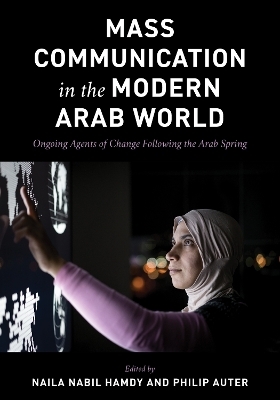
Mass Communication in the Modern Arab World
Rowman & Littlefield (Verlag)
978-1-5381-9918-3 (ISBN)
Mass Communication in the Modern Arab World: Ongoing Agents of Change following the Arab Spring introduces, explains, and explores how unceasing growth of media and communication technologies has acted as an ongoing agent of change in the modern Arab world Each contributed chapter provides evidence of mass communication’s potential to transform society, culture, politics, economies and development in a region where expectations of media and communication are higher than those of the Western world.
Studying these media platforms and communication channels and their relationship to governments and other social and religious institutions reveals how an area of over 400 million people has seen both good and bad of transformations from the global communication wave. Case studies of media formats and practices specific to the region illuminate cultural and political factors that impact the growth of media and allow it to positively contribute to all-encompassing democratization in the region.
List of Contributors: Azza A. Ahmed, Mohammad Ayish, Tayeb Boutbouqatl, Aliaa Dawoud, Khaled S. Gaweesh, Ahmed El Gody, Kamal Hamidou, Fran Hassencahl,Tara Al-Kadi, Kyung Sun Lee, Deanna Loew, Noha Mellor, Hesham Mesbah, Meriem Narimane Noumeur, Saddek Rabah, Abeer Salem, Hend El-Taher, Leonard Ray Teel, Oshane Thorpe, Karin Wilkins, and Inas Abou Youssef
Naila Hamdy is associate dean for the School of Global Affairs and Public Policy at the American University in Cairo. She has authored numerous articles in international journals covering the fields of journalism, global communication, and political engagement. She is a member of the board and a former president of the Arab-U.S. Association for Communication Educators (AUSACE). Philip Auter is the Hubert Bourgeois Endowed Professor of Communication and graduate coordinator for the department of communication at the University of Louisiana at Lafayette. Auter has authored over 40 journal articles, book chapters, and other contributions. He has presented at regional, national, and international communication conferences and was the lead author of a USAID Middle East Partnership Initiative grant. Auter is a member of the board of the Arab-U.S. Association for Communication Educators (AUSACE).
Introduction: The Arab Region’s History and Current State. Naila Hamdy and Philip Auter
Part I In the Beginning: Historical, Political, and Societal Issues Leading Up to the Arab Uprising
Chapter 1 Arab Regional Civic Action Before the Arab Spring: A Media–NGO Study from Casablanca to Dubai. Leonard Ray Teel
Chapter 2 Moroccan Communication Systems from the Era of Public Screamers to the Era of Facebook. Tayeb Boutbouqal
Chapter 3 Radio and TV Broadcasting in Algeria from Origins to the Present Day: Birth, Development, and Obstacles. Kamal Hamidou
Part II Governing Bodies: Media Influence, Power, Ownership, and Control
Chapter 4 Analyzing Media Power in the Arab World. Noha Mellor
Chapter 5 The Egyptian Media System in the Post-Transitional Period: Challenges Facing Media Reconstruction. Inas Abou Youssef
Part III The Politics of Influence: Making Policy and Swaying Public Opinion
Chapter 6 Public Relations of Key Middle Eastern Countries in the United States: Does Democracy Make a Difference? Hesham Mesbah and Deanna Loew
Chapter 7 Radio Sawa: Is Anyone in the Middle East Listening? Fran Hassencahl
Part IV The Pendulum of Progress: Top-Down and Participatory Media’s Role in Development Communication
Chapter 8 Sustainability Communication: The Evolving Landscape of Development Communication. Abeer Salem
Chapter 9 Toward Happiness, Accountability, and Transparency: ICTs in the E-governance of the United Arab Emirates. Oshane Thorpe
Chapter 10 Community Media and Development in Upper Egypt: A Case Study of Nagaawya Newspaper in Nag-Hammadi. Hend El-Taher
Chapter 11 Internet and Social Media in Algeria. Saddek Rabah
Part V Major Moves: Convergence, Globalization, and Technological Change
Chapter 12 Digital Disruptions in Traditional Arab Media Industries: An Analysis of Key Sectors Impacted by the Communications Transitions. Mohammad Ayish
Chapter 13 Global Gaming in the Arab World. Karin Wilkins and Kyung Sun Lee
Chapter 14 Understanding Egyptian Television: The Audience Perspective. Tara Al-Kadi
Chapter 15 Network Journalism in Post-Revolution Egypt. Ahmed El Gody
Part VI Cultural Evolution: Media’s Effects on Societal Norms and Expectations
Chapter 16 The Image of Emirati Culture in the Eyes of Non-Arab Expatriates. Khaled S. Gaweesh
Chapter 17 Women's Self-Representation Online: A Dramaturgical Interpretation of Identity Performance through Social Networking Websites. Meriem Narimane Noumeur
Chapter 18 An Analysis of YouTube Users’ Reaction to the Tunisian President’s Call for Gender Equality in Inheritance. Aliaa Dawoud
Chapter 19Binge-Watching TV and Its Implications in the Global Media Flow. Azza A. Ahmed
| Erscheinungsdatum | 02.04.2024 |
|---|---|
| Verlagsort | Lanham, MD |
| Sprache | englisch |
| Maße | 176 x 254 mm |
| Gewicht | 680 g |
| Themenwelt | Sozialwissenschaften ► Kommunikation / Medien ► Journalistik |
| Sozialwissenschaften ► Kommunikation / Medien ► Kommunikationswissenschaft | |
| ISBN-10 | 1-5381-9918-1 / 1538199181 |
| ISBN-13 | 978-1-5381-9918-3 / 9781538199183 |
| Zustand | Neuware |
| Informationen gemäß Produktsicherheitsverordnung (GPSR) | |
| Haben Sie eine Frage zum Produkt? |
aus dem Bereich


